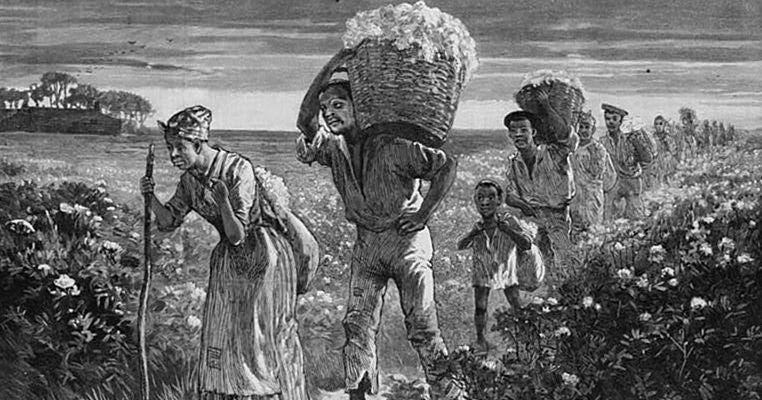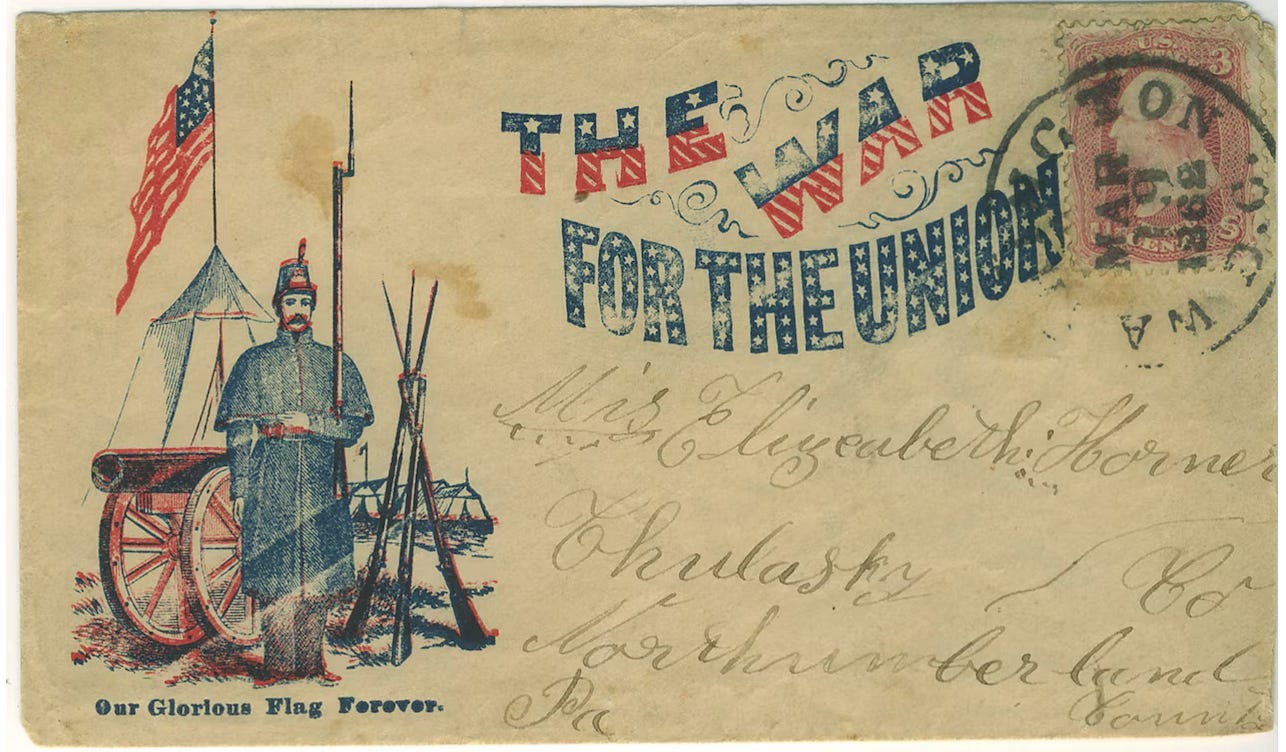What's in a Word: Language and the American Civil War
Historians have been doing a good deal of reflecting of late on how they use language. In 2018 Gaines Foster reflected on the importance of the very name that we attach to the “Civil War.” Many of us now routinely refer to the “enslaved” as opposed to “slaves” and “enslavers” as opposed to “slaveowner.” In both cases, the former acknowledges a relationship in which one individual exerted power over rather than to identities that went uncontested.
Kidada Williams dispenses with the concept of “plantation” in her new book about violence during the Reconstruction era. In her view the word “reflects the enslaving class’s romanticized views of slavery.” “‘Labor camp’ or ‘forced labor camp’ more accurately describes the living conditions enslavers forced upon the men, women, and children they held in bondage.” (p. 1)
This makes sense to me, though it does take some time to get used to. Williams also uses the term “Confederate” to refer to postwar vigilantes. She does this—if I understand her correctly—to demonstrate the continuity between the explicit cause of the Confederacy, experiences of Confederate soldiers during the war and the postwar fight to return the South to home rule and white supremacy.
In this case, however, it seems to me that the word choice obscures more than it illuminates. There is no question that former Confederates joined terrorist groups like the Klan and Red Shirts, but you didn’t have to fight in the rank-and-file to believe that violence was justified in reestablishing white control. In fact, you could have been a Southern Unionist during the war and embrace the same goal.
Another area in which we are seeing a shift in language revolves around whether we should continue to refer to the “Union” army or “United States” army. I have a good friend in Georgia who has been collecting primary sources that seem to show that the latter was widely embraced and that this constitutes a reason to follow suit. It’s a compelling argument.
I’m not quite there yet. In my current project about Robert Gould Shaw I use a number of different references. One argument in favor of dispensing with Union for United States army is in the recognition that the United States did not cease to exist between 1861 and 1865. Others have suggested that Lost Cause apologists have hijacked the idea of Union as a way to more easily reintegrate after the war.
Historian Andrew Lang authored a compelling essay for The Civil War Monitor magazine in 2021 that rejects this change in language.
Though former Confederates and their progeny hijacked the terms to serve their own ends, repudiating “Union” and “Union Army” today is a misguided proposition. Garnet’s and Kirkland’s beliefs about the purpose of the Civil War should compel modern audiences to reckon with the era in ways that resonated then with those men’s wartime counterparts. Central to this charge is recovering the primacy of Union to that mass of black and white Americans who waged a tenacious war against slaveholding secessionists. Union signified the national sovereignty of the United States, while also offering an enduring vision of the republic’s function and its potential. The Union embodied American civil society by providing an inclusive framework to reflect popular national consensuses derived from constitutional liberties. Only the Union could accommodate the 13th, 14th, and 15th Amendments, giving birth to a second American Revolution. The causes of Union and emancipation thus can never be divorced from the distinctive military forces raised in the Union’s defense. To jettison Union from our historical awareness is to misjudge the Civil War era and concede the legitimacy of the Lost Cause.
No doubt, there are many ways to demonstrate the importance of Union to the loyal citizenry of the United States, but I think Lang makes an important point that the army itself constituted its most potent expression.
He is not alone in resisting this shift in language.
Frances M. Clarke and Rebecca Jo Plant, authors of the new book Of Age: Boy Soldiers and Military Power in the Civil War Era, take a different approach to explaining their word choice.
The problem is that “US army” tends to suggest a singular and unified force, whereas the army at the war’s outset was in fact much like the nation itself—highly decentralized, with power divided between the states and the US government. To many, “US army” connoted the US government’s professional army—a small but permanent standing force. Often referred to as “the regulars,” these forces were thought of very differently from the mass of volunteers who mobilized to defeat the Confederacy. Though volunteer units ultimately served under federal control, to conflate the two forms of service is to confuse categories that mattered greatly over time. Indeed, a major goal of this book is to show how the war tended to erode the dual military system—a shift that is illuminated by the controversies surrounding underage soldiers. To best tell this story, we have retained language that reflects the distinction that Americans continued to draw between volunteer forces and the professional federal army, even as differences between the two became increasingly blurred. (pp. 1-2)
Indeed, Robert Gould Shaw drew a clear distinction in his letters home as he considered, on more than one occasion, to resign his commission in the Second Massachusetts for a place in the “regular” or professional army.
Finally, Neils Eichorn considers the language historians employ in the field of diplomatic history related to the Civil War.
We will not likely see a consensus emerge in regards to some of these issues nor is it necessarily a desirable end given the nature of language. It’s a reminder that language is a tool that when properly and thoughtfully applied helps to illuminate some aspect of the past that remains just beyond our understanding.




Words matter. I remember a not-so-gentle reminder decades ago that not all "southerners" were white, nor was "the South" a bloc. The border states as well as the thousands of Black and whites in blue meant that it was never a simple matter of "North versus South."
I've also used "Federal" for more than twenty years now. "Union" was certainly contemporary, but it also obfuscates in post-war discourse, as if the "Union" states and armies lost the right to be the United States until the war ended. I think it reinforces the "War between the States" trope. As another commentator mentions, even the volunteeers had those "US" buttons.
What intrigues me is how we have forgotten "National army," which people from Greeley to Grant used during and after the war. No one uses that now. It evaporated in the "romance of reunion."
Sometimes, I still use "slave" but "enslaved person" is important to me because I feel like it's a way of giving back to people from whom so much was taken from. That said, I think it's more a term for us than them because it's too late to make their lives any better. But I can do something to make how we remember them better. But last year, I pissed somebody off with the word "enslaved." I was asked to give a presentation at a reenactment event and I used the word. When I asked if anyone had any questions, one neo-Confederate guy referred to "enslaved" as "Cultural Marxism." Good grief.
As for "forced labor camp" as opposed to "plantation," I'm not so sure about that one. While I get the forced labor, plantations were still someone else's home. I guess the lesson there is how a person could live in what is supposed to be our most sacred place while others around them live a nightmare?
I still say "Union" and "Union Army" because those terms can be found in primary sources as well. But as for the other side, I've noticed that "rebel" and "rebellion" have fallen out of widespread use for "Confederate" and "Confederacy." I suspect that has something to do with neo-Confederates who insist that they were not in rebellion from the intent of the Founding Fathers. By they way, I have seen "so-called Confederate States" used on original documents.
Some people have also rejected the term "civil war" because war is not civil, not to mention that they believe the rebels were not fighting for anything the United States had. This is absolutely ridiculous. I think the fight was for which side could claim that they were the true heirs of the Founding Fathers. After all, both sides claimed to be Americans.
Last thing- I'm reluctant to use the term "African American" before 1865, even though the term was in use before that date. I don't have any problem with the term myself, but I just wonder if some of those enslaved people even wanted to be Americans at all.